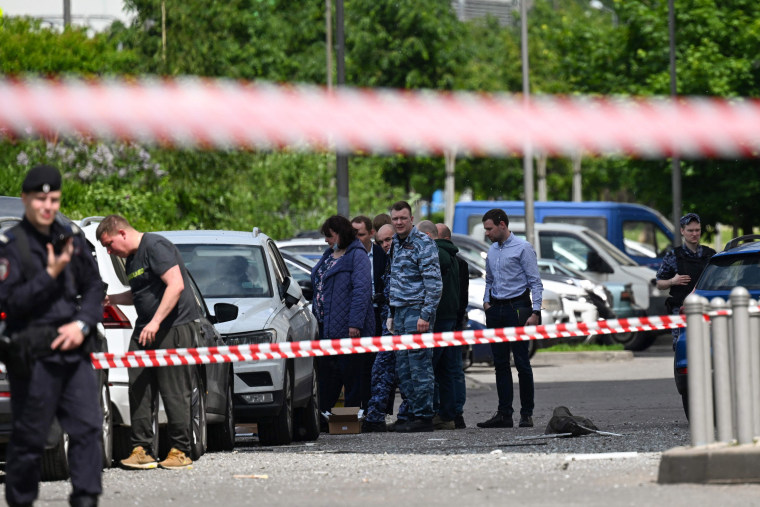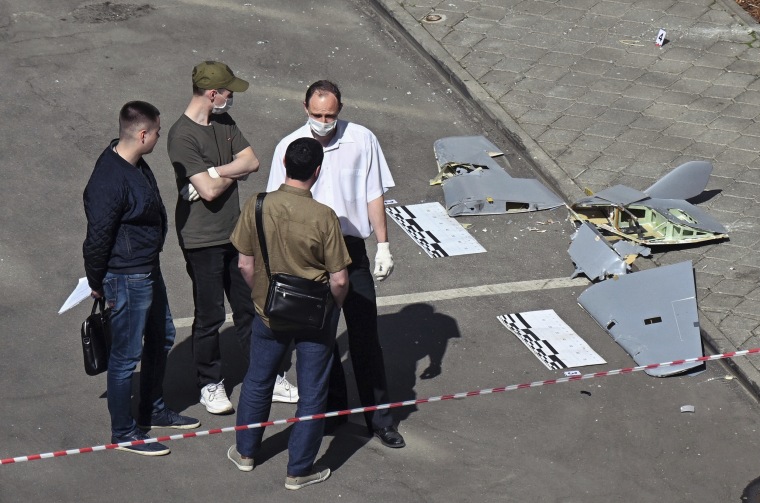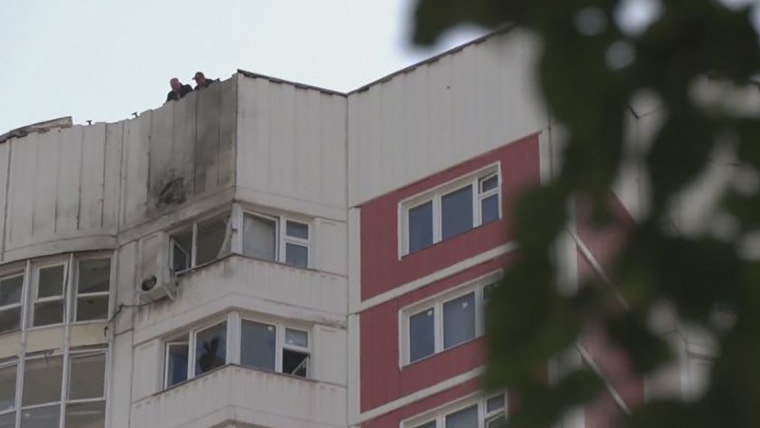MOSCOW — The Kremlin’s war is no longer a distant concern for many Russians.
For more than 15 months, the fighting has been focused on the battlefields and battered cities of Ukraine, while life continued largely as normal for millions across the border. But Tuesday’s drone assault — the first on civilian areas of Moscow since the war began — brought the reality of the conflict from the front lines to the Russian capital.
While President Vladimir Putin and his officials sought to play down the attack, which caused minor damage, some Moscow residents told NBC News it had left them shaken and concerned that more may be on the horizon. Influential pro-war voices also renewed their criticism of the Kremlin, following a wave of incidents that have exposed the country’s defenses and signaled the war was increasingly being waged deep inside Russia.
“I don’t feel safe,” said Anatoly, who did not want his last name used.
The war has made gauging public opinion in Russia difficult, with many people afraid to speak their minds or reveal their last names, especially to the foreign media, amid a fierce crackdown on dissent and any criticism of what the Kremlin calls its “special military operation” in Ukraine.

Anatoly, 83, said he was not so sure about the effectiveness of the city’s air defenses, despite Putin’s praise for their work. “If they even flew to Red Square, then they will get here all the more,” he said, referring to the recent drone attack on the Kremlin itself.
Moscow again blamed Kyiv for Tuesday’s incident, but Ukraine said it was not directly involved. The Russian Defense Ministry said eight drones were downed over the capital, with some residential buildings damaged and two people suffering minor injuries.
Anatoly was speaking on Leninsky Prospekt, a street in a quiet and well-off neighborhood of southwest Moscow that he has called home for 40 years. He had not woken up before to a drone crashing into a neighbor’s balcony.
But there was no sense of outward panic in the area. Children played in a playground and people enjoying the sunny weather stopped to peer at the building, which had a police cordon around it.
Residents Marina, 38, and her 8-year-old son, Kolya, who have been living in the neighborhood for nearly a decade, said the incident gave them “unpleasant feelings.”
“Everything is just beginning,” said Marina, who did not want her last name used out of fear of speaking out. “I don’t know who can have a sense of security right now.”
Svetlana, 61, another resident who also feared giving her last name, said she was out for a morning walk with her dog when she saw emergency services arriving and assumed there was a fire. She then learned that a drone had hit one of the buildings in the neighborhood.
“It was an unpleasant surprise,” she said. “A terrible nuisance. Tragic, one might say. You wouldn’t wish this on anyone, and what will happen next also nobody knows.”
Russian officials and propagandists largely shrugged off the drone attack, with many of the most outspoken Kremlin hawks refraining from comment on social media for hours, rather than rushing to urge escalation in response.
Some, like Margarita Simonyan, the head of the Russian state broadcaster RT, eventually waded in.
“There is no panic,” she said on Telegram, adding that it was business as usual on the streets of central Moscow. But “it will happen again,” she warned, and the real question is how Moscow authorities will respond if many more drones are launched at the capital.
Putin himself said in a brief statement much later Tuesday that the air defense work was satisfactory, and that there was an understanding of how to seal the capital’s skies going forward.

But some of Russia’s influential military bloggers questioned the nothing-to-see-here narrative from the Kremlin, framing the drone attacks as part of a psychological warfare campaign by Ukraine meant to intimidate Russian civilians — one that might be working.
“If the purpose of the raid was to stress the population, then the very fact of the appearance of Ukrainian drones in the sky over Moscow has already contributed to this,” the Telegram military channel Rybar, known for its pro-war position, wrote to its 1.1 million followers shortly after the attacks.
The “inert reaction” of Putin and his officials creates the feeling that the Russian leadership does not understand the full danger of the situation in which the country finds itself, Tatiana Stanovaya, founder and head of the political analysis firm R.Politik and a nonresident scholar at the Carnegie Endowment for International Peace, wrote in her analysis.
Putin is more concerned about stoking alarm that might force the Kremlin to respond with limited resources and options, she said, than he is of being undermined by an appearance of weakness. “No matter how daring the next Ukrainian attack is, Putin doesn’t think it can provoke dissatisfaction with the authorities in Russian society,” she added.
Despite growing public criticism, some analysts agreed with that calculus and doubted the attack would have a serious impact on the Russian public’s support for Putin and the war.
“The attack caused little damage, was irrelevant for most Russians, and is being finessed by the Russian media as another Ukrainian provocation in the face of Russian restraint,” said Christopher Tuck, an expert in conflict and security at King’s College London.
“Single incidents such as this will not change Russian domestic politics appreciably,” he said. “What matters more are larger trends, such as the situation on the ground in Ukraine and the level of Russian military casualties.”
Tatyana Chistikova reported from Moscow, and Yuliya Talmazan from London.







